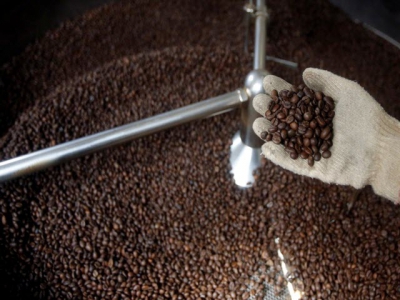Coffee trading in Vietnam stays dull as market awaits new season supply

Coffee trading in Vietnam remained lacklustre this week as stockpiles dwindled and supply from the new season is unlikely to be available in around a month.
A man checks roasted coffee beans at a factory in Hanoi, Vietnam November 22, 2016. Photo: Reuters
Farmers in the Central Highlands, Vietnam’s largest coffee-growing area, sold coffee COFVN-DAK at VND34,000 (US$1.47) per kilogram on Thursday, slightly lower than a week ago.
The 2019-20 season started on Tuesday but traders said the market would stay muted until at least early November when new beans arrive.
“There are almost no beans left from the 2018-19 season,” said a trader based in the Central Highlands. “Fresh beans won’t arrive in bulk until the second week of November.”
Traders in Vietnam offered five-percent black and broken grade-two robusta COFVN-G25-SAI at $180-200 premium per metric ton to the November contract on Thursday, unchanged from a week ago.
“Trade, supply and demand are all dull at the moment,” said an analyst, also based in the region.
Vietnam’s coffee exports in the first nine months of this year fell 12 percent from a year earlier to 1.27 million metric tons, or 2.12 million 60-kilogram bags, according to government data.
Meanwhile, Indonesia’s grade-four defect 80 robusta beans COFID-G4-USD were offered at premiums of $210-215 to the November contract, wider than $200 last week, a trader in the Sumatran province of Lampung said.
Another trader in the province said trade had slowed down this week as the main harvest came to an end.
Indonesia’s robusta coffee bean exports from Sumatra rose 75% in September from the same month last year, local trade office data showed on Tuesday.
Related news
 Fruit and vegetable exports to major markets continue with downtrend
Fruit and vegetable exports to major markets continue with downtrend Vietnam’s fruit and vegetable exports from the beginning of the year to the first half of September experienced a downward trend with exports to China
 Vietnam seeks to boost demand for its rice exports
Vietnam seeks to boost demand for its rice exports Vietnamese rice prices reached a record high in 2018, but a drop in demand by major importers has made it harder for exporters to maintain the record this year.
 Prices of agricultural produce drop sharply
Prices of agricultural produce drop sharply The Ministry of Agriculture and Rural Development’s statistics has shown a sharp decline in the prices of agricultural produce.